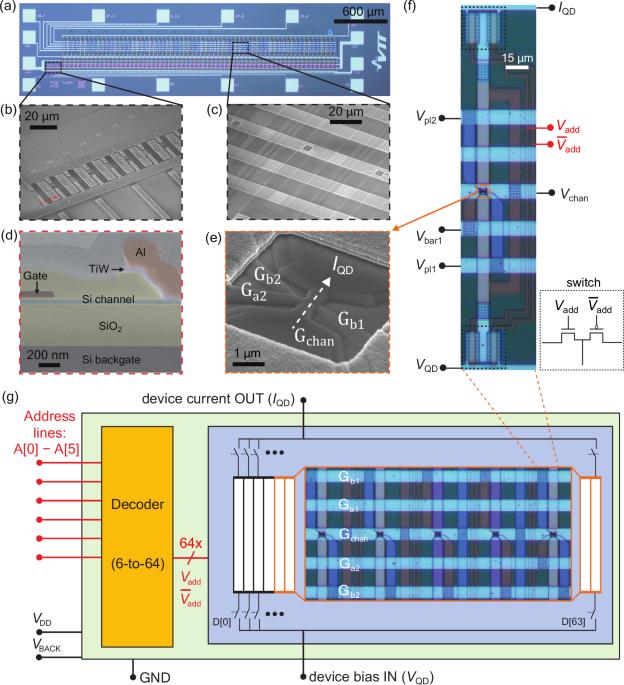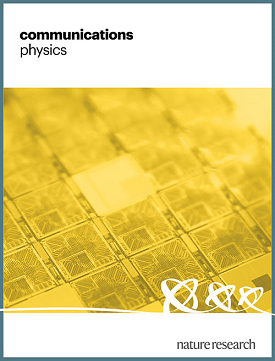Scalable on-chip multiplexing of silicon single and double quantum dots
IF 5.4
1区 物理与天体物理
Q1 PHYSICS, MULTIDISCIPLINARY
引用次数: 0
Abstract
Owing to the maturity of complementary metal oxide semiconductor (CMOS) microelectronics, qubits realized with spins in silicon quantum dots (QDs) are considered among the most promising technologies for building scalable quantum computers. For this goal, ultra-low-power on-chip cryogenic CMOS (cryo-CMOS) electronics for control, read-out, and interfacing of the qubits is an important milestone. We report on-chip interfacing of tunable electron and hole QDs by a 64-channel cryo-CMOS multiplexer with less-than-detectable static power dissipation. We analyze charge noise and measure state-of-the-art addition energies and gate lever arm parameters in the QDs. We correlate low noise in QDs and sharp turn-on characteristics in cryogenic transistors, both fabricated with the same gate stack. Finally, we demonstrate that our hybrid quantum-CMOS technology provides a route to scalable interfacing of a large number of QD devices, enabling, for example, variability analysis and QD qubit geometry optimization, which are prerequisites for building large-scale silicon-based quantum computers. The integration of quantum dot spin qubits and classical cryogenic microelectronics is important for scaling up silicon-based quantum computers. The authors show that their silicon technology tailored for low-power electronics and low-noise quantum dots enables the integration of classical multiplexers and quantum dot spin qubit devices on the same chip.

硅单量子点和双量子点的可扩展片上复用
由于互补金属氧化物半导体(CMOS)微电子技术的成熟,利用硅量子点(QD)中的自旋实现的量子比特被认为是构建可扩展量子计算机的最有前途的技术之一。为实现这一目标,用于控制、读出和连接量子比特的超低功耗片上低温 CMOS(cryo-CMOS)电子器件是一个重要的里程碑。我们报告了 64 通道低温 CMOS 多路复用器与可调电子和空穴 QD 的片上接口,其静态功耗小于可检测到的水平。我们分析了电荷噪声,并测量了 QD 中最先进的加法能量和栅极杠杆臂参数。我们将量子点中的低噪声与低温晶体管中敏锐的开启特性联系起来,两者都是用相同的栅极堆栈制造的。最后,我们证明了我们的混合量子-CMOS 技术为大量量子点器件的可扩展接口提供了一条途径,例如,可实现变异性分析和量子点量子比特几何优化,这是构建大规模硅基量子计算机的先决条件。量子点自旋量子比特与经典低温微电子学的集成对于扩大硅基量子计算机的规模非常重要。作者展示了他们为低功耗电子器件和低噪声量子点量身定制的硅技术,可在同一芯片上集成经典多路复用器和量子点自旋量子比特器件。
本文章由计算机程序翻译,如有差异,请以英文原文为准。
求助全文
约1分钟内获得全文
求助全文
来源期刊

Communications Physics
Physics and Astronomy-General Physics and Astronomy
CiteScore
8.40
自引率
3.60%
发文量
276
审稿时长
13 weeks
期刊介绍:
Communications Physics is an open access journal from Nature Research publishing high-quality research, reviews and commentary in all areas of the physical sciences. Research papers published by the journal represent significant advances bringing new insight to a specialized area of research in physics. We also aim to provide a community forum for issues of importance to all physicists, regardless of sub-discipline.
The scope of the journal covers all areas of experimental, applied, fundamental, and interdisciplinary physical sciences. Primary research published in Communications Physics includes novel experimental results, new techniques or computational methods that may influence the work of others in the sub-discipline. We also consider submissions from adjacent research fields where the central advance of the study is of interest to physicists, for example material sciences, physical chemistry and technologies.
 求助内容:
求助内容: 应助结果提醒方式:
应助结果提醒方式:


